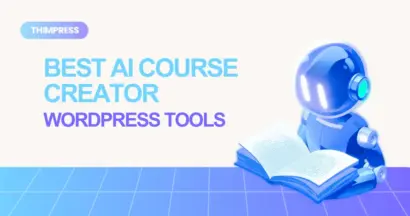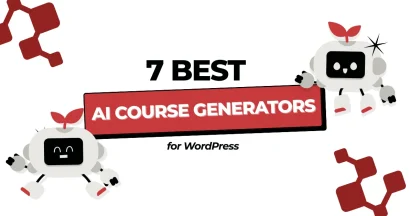Generative AI is fundamentally changing our digital lives, and how we find information is at the forefront of this revolution. While traditional web search is still prevalent, a new wave of powerful and intuitive tools is emerging. If you’re ready to move beyond lists of blue links, it’s time to explore a dedicated AI search engine.
Unlike standard search engines like Google that are integrating AI features like “AI Overviews,” a true AI search engine is built from the ground up on generative AI. These platforms don’t just point you to web pages; they scan the live web for the most current information, synthesize it, and provide you with a direct, comprehensive answer.
The primary advantage is a massive boost in research productivity. Instead of opening multiple tabs and piecing together information, you can get the core knowledge you need from a single prompt. Furthermore, these tools excel at contextual conversations. You can ask follow-up questions, and the AI will remember the previous parts of your discussion, eliminating the need to constantly rephrase your queries.
However, it’s important to remember that, like all generative AI, these tools can sometimes make mistakes. The best platforms provide source links, allowing you to verify the information.
Ready to see the future? Let’s explore the most impressive AI search engines available today.
Eduma – Education WordPress Theme
We provide an amazing WordPress theme with fast and responsive designs. Let’s find out!
6 Best AI Search Engines to Try
Here are six standout platforms, each with unique strengths, that are redefining what a search engine can be.
1. Perplexity AI: Best for News and Research
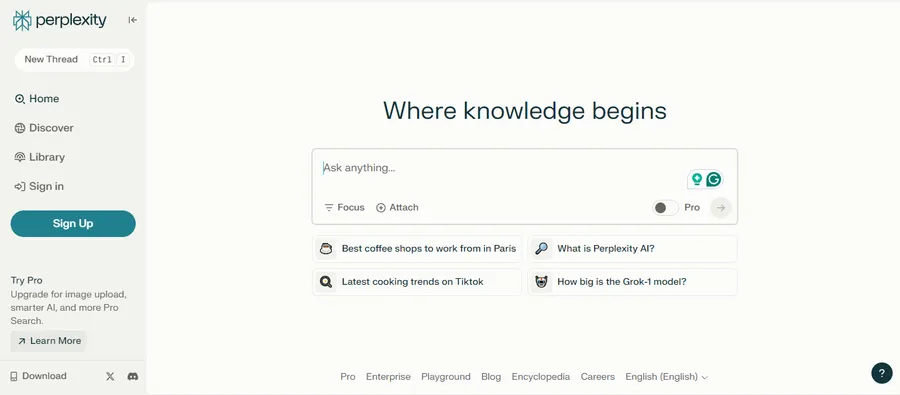
Perplexity AI operates much like a research assistant. It excels at providing direct, well-sourced answers to complex questions. Its interface is clean and focuses on delivering information efficiently, saving your search history into “Threads” that you can revisit and continue at any time.
If you want a broader overview of AI-powered search tools—such as Bing, DuckDuckGo, and more—check out our post on 11 Best Search Engine Alternatives to Google, which includes Perplexity.ai comparisons.
Key Features:
- Clear Sourcing: Citations and links to sources are prominently displayed with every answer, making verification easy.
- Threads: Saves conversation history, allowing for contextual follow-up questions.
- Discover Page: A curated feed of trending topics and news, similar to Google News.
- Spaces: A collaborative feature where you can organize research, upload files (like PDFs), and use AI to analyze and summarize them.
Best For: Researchers, students, and anyone who values accuracy and the ability to easily check sources for their information. It is an excellent tool for in-depth research tasks.
2. You.com: Best for Business Productivity
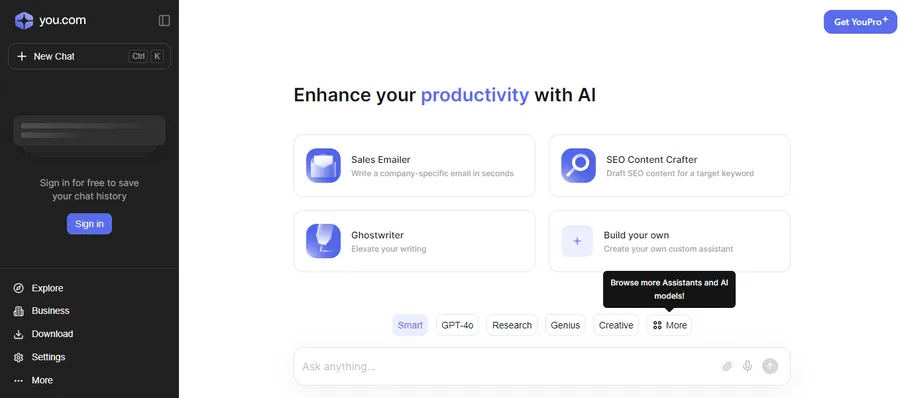
Positioning itself as an “AI workplace for productivity,” You.com is a powerful AI search engine tailored for business and professional use. It moves beyond simple search to offer a suite of tools designed to accomplish specific tasks, from writing emails to analyzing data.
Key Features:
- Custom Agents: Build or use pre-made agents for specific industries and tasks like Marketing, Sales, or Engineering.
- Task-Oriented Prompts: Features buttons like “Research,” “Create,” and “Compute” to guide users toward a specific outcome.
- Advanced LLM Access: Pro plans provide access to leading models like GPT-4o and Claude 3.5 Sonnet.
- Privacy Options: Team plans offer zero-data retention, ensuring that your queries are not used for AI training.
Best For: Business professionals and teams looking for an integrated AI tool to enhance productivity and streamline workflows.
3. Komo: Best for Targeted Search Categories
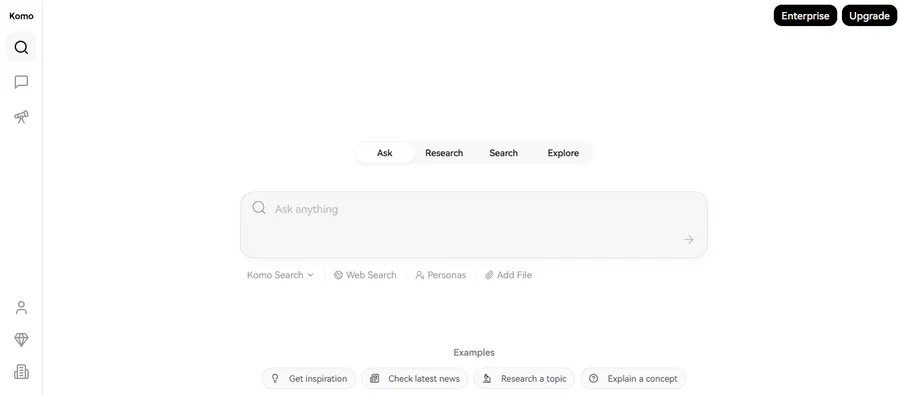
Komo is designed for users who need highly targeted search results. Its simple interface hides powerful filtering tools that allow you to refine your search in ways that other platforms don’t, making it a specialist’s choice.
Key Features:
- Personas: Tune AI responses for specific needs with personas like “Copy Writer,” “Equity Researcher,” or “Planner.”
- Data Corpus Selection: Limit your search to specific sources, such as Academic, Blogs, News, or Social media.
- Mind Map: A unique feature that visualizes your search results in a branching chart, helping you see connections and related topics.
- Model Selection: Paid tiers allow you to choose from various AI models, including versions of Claude, Gemini, and Llama.
Best For: Content creators, marketers, and researchers who need to perform highly specific queries and tailor the AI’s output to a particular style or format.
4. Andi: Best for General Consumer Search
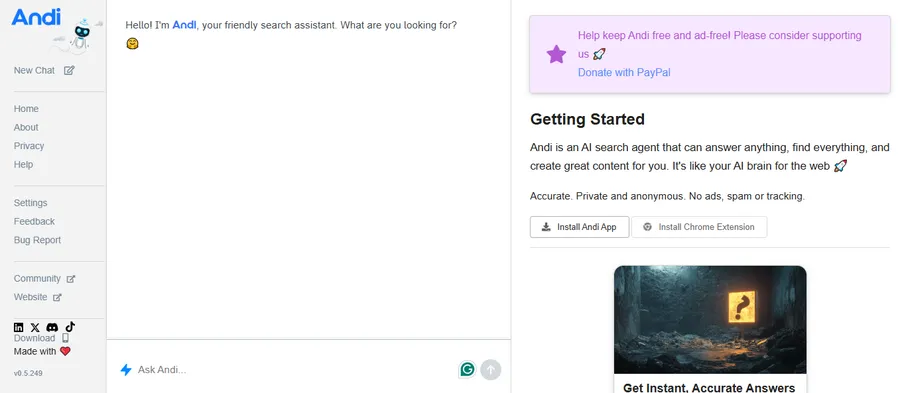
Andi presents itself as “search for the next generation.” It offers a visually clean, user-friendly experience that feels like a modern evolution of the classic search page. It’s an excellent entry point for anyone curious about what an AI search engine can do.
Key Features
- Direct Answer Display: Shows a main, AI-generated response with additional web links in a side panel for further reading.
- Summarize Results: A feature that generates a more detailed, written explanation of the search findings.
- Multiple View Options: Display results as cards, a list, tiles, or even traditional blue links.
- Free and Anonymous: Currently free to use without requiring an account, with a focus on user privacy.
Best For: General consumers looking for a simple, straightforward, and visually appealing search experience that provides direct answers without overwhelming features.
5. ChatGPT Search: Most Advanced AI Model
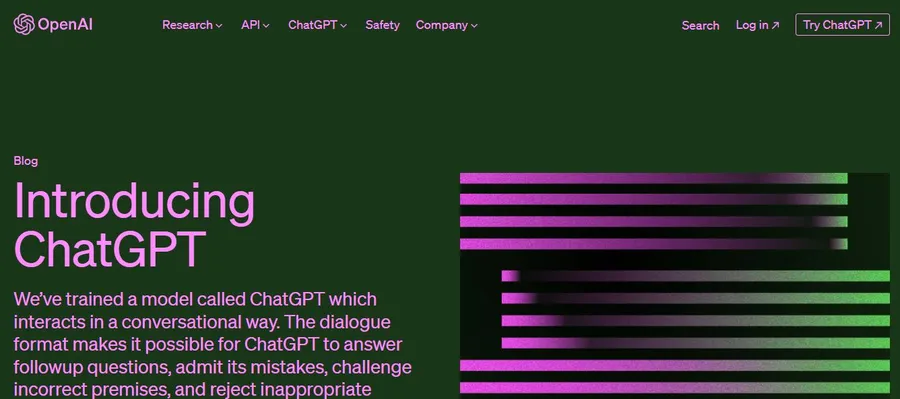
The tool that brought generative AI to the mainstream, OpenAI’s ChatGPT now includes a powerful web search function. It’s seamlessly integrated into the familiar chat interface, allowing the AI to pull live information from the web when its internal knowledge isn’t sufficient — read more about its early iteration, SearchGPT, in “What Is SearchGPT? Discover New OpenAI Prototype.”
Key Features:
- Advanced AI Models: Utilizes OpenAI’s state-of-the-art models, including GPT-4o, for nuanced and comprehensive answers.
- Conversational Context: Excels at maintaining the context of a long conversation, making it ideal for deep-dive explorations of a topic.
- Multi-Platform Availability: Accessible via web, dedicated desktop apps (macOS, Windows), and mobile apps (Android, iOS).
- Source Links: Provides links to the web pages it used to formulate its answer.
Best For: Existing ChatGPT users and anyone who wants the power of the world’s most advanced language models applied to their web searches.
6. Bagoodex: Best for Interface and Model Choice
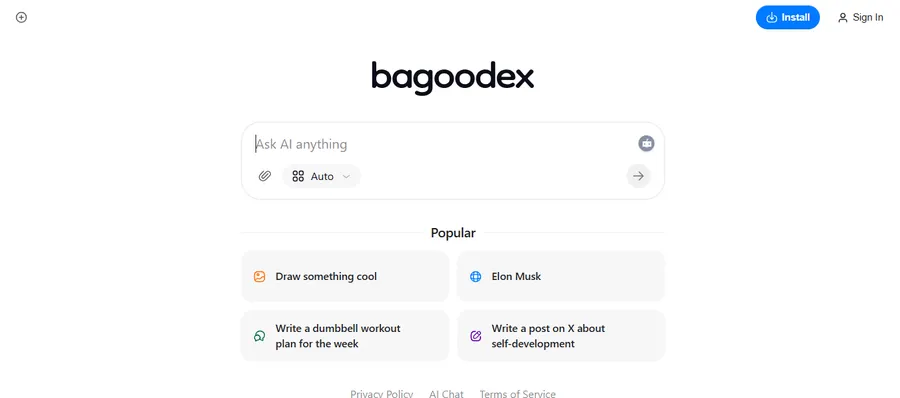
Bagoodex stands out with one of the clearest and most intuitive interfaces among the new AI search engines. It successfully blends the feel of a traditional search engine with the power of generative AI, making the transition seamless for new users.
Key Features:
- Choice of LLMs: Switch between chat modes that use ChatGPT, Claude, Gemini, and other models.
- Image Generation: Can create images using DALL-E, Flux, or Recraft models directly from a prompt.
- Provides Sources: Displays sources for its answers and maintains your query history in a thread.
- Free and Credit-Based Model: Search is free, with a daily credit allowance for more advanced chat and image generation features.
Best For: Users who want a simple interface but also desire the flexibility to switch between different AI models or generate images.
A Note on AI Search Engine Optimization Tools
As the AI search engine becomes more popular, the field of SEO is evolving — learn how to adapt in our guide How to Use AI for SEO. While the source text doesn’t detail specific platforms, the rise of these engines signals a shift in content strategy. AI search engine optimization tools are emerging to help creators adapt. The focus is moving toward:
- Semantic SEO: Creating content that directly answers a user’s intent, not just targets a keyword.
- Clear Structure: Using proper headings (H1, H2, H3), lists, and clear language that AI can easily parse and summarize.
- E-E-A-T (Experience, Expertise, Authoritativeness, Trustworthiness): AI models will increasingly be trained to prioritize information from reputable sources. Building authority is more important than ever.
FAQs
1. What is an AI search engine?
An AI search engine uses large language models (LLMs) to understand a user's query, search the live web for relevant information, and then synthesize that information to generate a single, direct answer, often in a conversational format. This differs from traditional search engines that primarily provide a list of links to external websites.
2. Are there any good AI search engine free options?
Yes, many of the best platforms offer robust free tiers. Andi is currently completely free. Perplexity, You.com, and Bagoodex offer excellent AI search engine free versions with certain limits on advanced searches or features per day. ChatGPT also provides free access to its search capabilities.
3. How is an AI search engine different from Google with AI Overviews?
While Google's AI Overviews provide an AI-generated summary at the top of the results, its core function is still to provide a list of links. A dedicated AI search engine is built around the AI-generated answer as the primary result. The entire experience is designed for conversational follow-ups and direct information synthesis, rather than acting as a directory.
4. Can I trust the answers from an AI search engine?
While highly advanced, AI models can still make errors or "hallucinate" information. It is a sign of a high-quality AI search engine when it provides clear links to its sources. You should always use these sources to verify critical information, especially for academic or professional work.
5. What are AI search engine optimization tools?
This refers to tools that help optimize content to rank better on search engines. While the platforms listed above are primarily search tools for users, not SEO tools for professionals, many of their features can be used for SEO tasks. For example, you can use Komo’s “Personas” or You.com’s “Create” functions for topic ideation, keyword exploration, and generating draft content outlines, which are key parts of search engine optimization.
Read more:
9+ Best AI Email Generator Tools
Top 12 AI Video Generator Tools (Free & Paid) to Create Stunning Videos
7+ Best Online Code Editor Tools
Contact US | ThimPress:
Website: https://thimpress.com/
Fanpage: https://www.facebook.com/ThimPress
YouTube: https://www.youtube.com/c/ThimPressDesign
Twitter (X): https://x.com/thimpress_com

